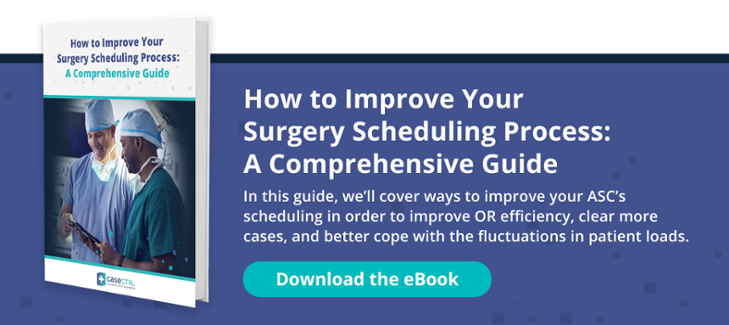Complex doesn’t even begin to describe the surgery scheduling process. Did you know there is a minimum of 150 data points to be analyzed by multiple stakeholders just for one surgical procedure to be accurately scheduled? To make it successful, all data points must be mapped out correctly—which makes it one of the most labor-intensive and critical functions of operating room management. Not only that, but the multiple stakeholders involved in the process may not be communicating with one another or even realize how their role in the surgery scheduling process impacts the big picture. The scheduler must juggle competing demands like surgeon requests, space or timing constraints, and staffing specifications, all of which are constantly in flux.
In an environment where every second counts and surgeons and schedulers are stretched thin, cases inevitably get scheduled based on only a few data points, but at what cost? Those cases often end up being less efficient or risk cancellation because something was missed.
It is here, in the scheduling process, where every seemingly small decision made can affect everything from patient safety, comfort, efficiency—right down to your practice’s bottom line.
According to Becker’s Hospital Review, “The surgery scheduling request form has evolved with changes in technology and become more effective. The original request forms were in paper format, to be completed and faxed to the surgery scheduling office. However, a surgeon's office sometimes inadvertently left portions blank, requiring a series of back-and-forth phone calls to obtain essential case information.”
How are modern ASCs taking a smarter approach to surgery scheduling? In this blog, we’ll explore how having an electronic scheduler can alleviate some of the common obstacles to smooth surgery scheduling.
The Rise of the Electronic Scheduler
Appointment scheduling systems allow for timely access to health services. With all the complexities involved in surgery scheduling, it is probably no surprise that a number of companies have jumped to the forefront to provide cutting edge, high-tech, cloud-based solutions to the market that are revolutionizing the process.
Still, knowing how to schedule surgery is as much an art as it is a science, and despite the fact that advanced technology such as artificial intelligence (AI) is incorporated into newer surgery management solutions, many aspects of the surgical scheduling process still rely on the skill and intuition of the scheduler, so it’s important that both of these considerations are taken into account.
The labor-intensive and, ultimately, manual nature of scheduling combined with the sheer volume of work can become overwhelming for staff and, in extreme cases, cause burnout. To overcome these issues and to introduce tech-driven efficiencies into the process, an electronic scheduler can automate some of the more repetitive tasks.
Once a digital transformation is embraced and implemented into the scheduling process, a single scheduling administrator can use his or her expertise combined with automated systems to complete more tasks in a day, which can free up more time to assist surgeons when needed.
It’s not just time and administration savings that can be realized—cost savings can occur too. You may be surprised to learn that every year surgeons are leaving about $400k on the table. Without a modernization strategy in place, the process can be slowed down. Practice admins need a process that’s trackable, measurable, and gives them the tools to provide the necessary vision to diagnose problems in your surgery pipeline and, thereby, protect your bottom line.
Surgery Scheduling Considerations
To effectively schedule surgery, consider three important patient outcomes: safety, efficiency, and service. Of course, surgical schedulers must make decisions based on clinical needs as the safety of the patients is paramount. To schedule surgery safely, thorough consideration must be given to infection control, patient and preoperative preparation, and practical considerations like the length of time needed to perform the surgery, and how each time period impacts all the other procedures in the pipeline.
Only once patient safety has been properly assessed and factored into the scheduling process, the scheduler can start to look at efficiency. Operating room efficiency can mean prioritizing and reordering cases to minimize delays during the surgical period.
Whether you are saving lives or improving the quality of patients’ daily living, surgeons are essentially providing a service. This means it is still important to consider the patient’s convenience. “Your scheduling process must be as simple and painless as possible if you want to increase your case volume,” Jessica Nantz, president and CEO of the consulting firm Outpatient HealthCare Strategies, reports in Becker’s ASC Review.
This consideration can come in many forms, such as reducing waiting time by scheduling the surgeries with the most predictable outcomes first—just not at the expense of patient safety or practice efficiency.
A well-designed scheduling tool can help maximize the efficient use of your operating room and surgical resources. These tools help schedulers understand their priorities and reduce the amount of time to schedule cases to help your practice operate safely, profitably, and efficiently.
Exploring Solutions
Author Heather Linder has this to say in “6 Tips for Smarter Case Scheduling”: “Many practices are concerned with implementing new technology and changing their processes because of the time and energy put into the change. However, more information technology companies are becoming savvy to these concerns and simplifying the integration process by using the Cloud.” In other words, making this kind of important transition demands the right software partner.
Providing a user-friendly way to track surgical candidates, resources, hundreds of data points, and automate the numerous repetitive tasks requires technological sophistication—as well as insider knowledge of the industry. Designed by an orthopedic surgeon, CaseCTRL’s scheduling software acts as an intelligent repository that automates important parts of the scheduling function so that practices are no longer dependent on one person. The use of electronic schedulers lessens your risk for lost time and lost revenue.
Using an integrated dashboard, your scheduler can move faster while ensuring accuracy with AI-enabled patient guides, and automated reminders, and an intuitive interface that can analyze case-specific risk factors. Learn how smarter scheduling solutions can move your practice forward by contacting us or scheduling a software demo.







































